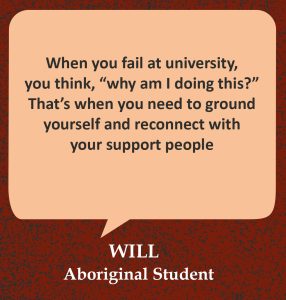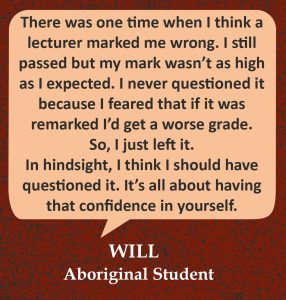56 Failing Assessments of Any Kind
Wendy Hargreaves
Failure can become a pathway for future achievement. Image by Allan Mas is used under a Pexels License.
Why Do We Have Assessment At All?

The purpose of exams/tests/quizzes in college is to check whether a student is meeting the course objectives (or goals). In other words, it is a way to collect proof that you have the knowledge and skills that were taught. For students, assessments can feel like jumping over hurdles. The university will only award your qualification if your results reach set benchmarks. Consequently, assessment is a necessary part of college; and where there is potential to pass, there is also potential to fail.
Failure in college can look like a lot of different things. Perhaps it is a little comment someone makes about one component of one small task or perhaps it is a failing grade for an entire course. The good news is that, whatever the size or nature of the failure, there are strategies that can turn this experience into something useful and positive, and put you back on the road to success. The journey begins when you first receive news of your results.
Acknowledging Your Feelings

Finding out that you have failed something is often an uncomfortable experience. Failing can evoke strong, unpleasant feelings and thoughts that may negatively affect your confidence, self-esteem, motivation, and mood. You may feel angry, sad, disappointed, shocked, worried, distressed, anxious, and many other things, and you can feel them all at the same time. It is normal to experience strong feelings, particularly when you have invested a lot of time and effort in a task. It may be helpful to talk with a trusted friend or relative to vent and defuse some of those powerful emotions. Services offered by your university, such as academic coaches, psychologists, and other healthcare professionals, can offer perspectives and support to help you manage your thinking and feelings productively.
Those first few hours, or a day, of dealing with the news that you failed an exam can feel particularly intense. The discomfort is raw and fresh, and can consume your thinking. Sometimes people find it helpful to “stand back” to lessen the power of the feelings a little. Try to do something to give your body and mind a break from the stress. Perhaps you might enjoy some sport or exercise, watching a movie, catching up with friends, or playing a computer game. Spending this time on self-care buys critical time for your body and mind to return to a healthier state, where they can function better. Taking this time may also stop you from acting out rashly when you are angry or sad, before you have considered which course of action will achieve the most helpful outcome. Most importantly, if you find that your negative thoughts and feelings continue to interfere with feeling okay and with living your everyday life, then access CAPS for professional support as soon as possible.
The purpose of dealing with your feelings is not to eliminate them, but rather to find a place for them in your thinking where they do not stop you from moving towards a positive future.
Video: Watch “It’s the End of the World” by the University of Southern Queensland (licensed under CC-BY-NC-SA) to see how one student experienced a disappointing result and moved forward:
Acknowledging the power and influence of your feelings and finding an acceptable place in your world frees you to take actions that maximize the learning from an experience of failing. It’s all part of having the growth mindset discussed earlier.
An Important Action
Dealing with your feelings can consume energy and focus, but there’s one important action to take in the first day or two of receiving the news of failure—check to see if there is anything you can or need to do immediately. If it’s a failed exam, if you talk with the instructor, you might be able to retake the exam or “fix” the wrong answers for some credit.
If you failed a class, and it is one in your major or if it drops your GPA below a 2.0, you may be placed on Academic Warning or Academic Probation within your department or at the university level. A required action could be a number of different things, so look out for any notifications, emails, and instructions from your Department Chair or university. Responding promptly and appropriately to time-sensitive instructions set by your university or Department can make a critical difference to your academic future. Be sure to make inquiries if you need clarification of what to do. Once you clearly understand and respond to any required actions and deadlines, you can slow down and take time to reflect on what happened. If you need help, see your Academic Coach at THINK TANK.
Identifying Why You Failed
Once you have addressed any time-sensitive instructions and you are prepared emotionally to explore what happened, you can turn your attention to identifying why you failed. Pinpointing the cause, or causes, can help you figure out what to change in the future. Self-examination can be a personally confronting and uncomfortable experience. It’s human nature to defend our weaknesses and shift the blame for a failure to something or someone else. Unfortunately, at times our desire to protect our self-esteem and reputation reduces our willingness to admit objectively if we contributed to our failure. The trick here is to be able to tell when an external factor genuinely caused your failure and when it is your own mind being overprotective of you.

“This picture uses Aboriginal Art to depict self-reflection. The blue and purple tones represent the mirroring qualities of water, with flowing water in the center showing the continuity of self-reflection and personal growth. Notice how the shapes on each side are similar, yet the colors are switched, and the forms are mirrored and inverted. This shows that reflection can distort but the core remains the same. Likewise, self-reflection helps us to change without losing who we are in the process.” Kc Rae, Aboriginal artist.
If you want to learn from what happened so you can change your results next time, there’s no benefit in misdiagnosing what went wrong. If you don’t admit to yourself truthfully why you failed, then you may try to change the wrong things. Even if you don’t wish to tell others why you failed, being honest with yourself is essential. It ensures that you change the things that really will make a difference to your progress.
3-Step Action Plan for Future Success
The next part of this chapter is an activity for building your personal action plan to turn assessment failure into future success. The three-step process helps you to identify what happened and what to do about it. You will be creating a table for this activity.
Step 1: Identify the Contributors
Begin by thinking about one specific assessment task or exam that you failed. The “Action Plan for Future Success” table shown below lists common factors that contribute to why students fail (See Table 1). Place a check mark in the IF YES column beside every factor that you think contributed to the result. Checkmark as many factors as you like. There are empty lines at the bottom of the table to add factors you think of that are not listed.
To help you complete the table, refer to any feedback you have received about your performance to understand why you failed. Using written comments and the grading rubric can help you pinpoint where things went wrong. If you have trouble understanding the feedback, you can ask to meet with your professor or tutor, or your academic coach, to help interpret it. The feedback may include what you did well, too. Don’t forget to congratulate yourself on your successes. Sometimes we are so focused on the negatives that we forget to be proud of our achievements.
| FACTORS THAT CONTRIBUTED TO FAILING A TASK | If Yes
✔
|
ACTION I can change this next time by… I can seek help to change this by… I can investigate this situation further by… |
| I didn’t understand part or all of the assessment task requirements. | ||
| I misinterpreted part or all of the task. | ||
| I didn’t observe the required number of words. | ||
| I left something out of the task. | ||
| I included work that wasn’t relevant to the specified task. | ||
| I had errors in the work I submitted. | ||
| I had insufficient references providing evidence. | ||
| I didn’t correctly cite my sources of information. | ||
| I didn’t refer to the case study I was given. | ||
| I didn’t paraphrase correctly. | ||
| I didn’t do my own work. I claimed work from someone else or from artificial intelligence as my own. | ||
| I worked with other people on my assignment or exam when it should have been an individual task. | ||
| I performed poorly on the day of the exam. | ||
| I cheated in an exam. | ||
| I couldn’t remember everything I needed for my exam. | ||
| I didn’t study or prepare for some of the topics asked in my exam. | ||
| I didn’t attend my exam. | ||
| I failed due to non-attendance at class or another mandated event, other than an exam. | ||
| I had technological difficulties in completing a task or exam. | ||
| My practical skills were not adequate for a practical skills test. | ||
| I believe my assessment item was graded inaccurately. | ||
| I believe my assessment item was graded unfairly. | ||
| I didn’t submit part or all of the assessment. | ||
| My writing skills affected my grade negatively. | ||
| My writing style wasn’t appropriate for the specific task, e.g., it was too descriptive, emotive, personal, not analytical, not critical, not reflective. | ||
| My ability to speak or write in English affected my grade badly. | ||
| My maths skills affected my grade negatively. | ||
| I didn’t show all my work in a math task. | ||
| I used a calculator or an online calculator when I shouldn’t have. | ||
| A personal circumstance disrupted my study and ability to perform or complete a task, e.g., health, safety, finance, caring for others, living arrangements, lack of a personal support network that values study. | ||
| I have an ongoing physical or mental health condition that has impacted my study. | ||
| I experienced a change in life that affected my priorities and/or time. | ||
| I did not manage my time well and ran out of time, so I produced poor or incomplete work. | ||
| I had more commitments than I had time to meet them. | ||
| I procrastinated. | ||
| I think I self-sabotaged my work (consciously or unconsciously did something to block my success). | ||
| I had difficulty understanding the whole subject I’m studying. | ||
| I don’t know what I did wrong. | ||
|
|
||
|
|
Download a PDF of the Action Plan for Future Success here: Table 1
Step 2: Review and Amend
After you have completed the table, take some time to reflect on your responses. Ask yourself, “Were my answers completely realistic and honest, or did I try to protect myself by blaming something or someone else for why I failed?” You might like to ask another student, a close friend, or a relative whether they think you have been objective about what happened. People who know you well may identify factors that you missed. After you’ve reflected on your responses, make any adjustments you need so your list is as accurate as possible. Remember, the more accurate your list, the more likely you’ll be fixing the right problem.
Step 3: Write an Action
The third step is to identify and write in the table what action you can take in the future to produce a different result. There are three kinds of actions you can take. The first is an action where you feel confident that you can change something yourself. For example, if you lost points on your assignment because you didn’t observe the word limit, you may feel sure that you can fix it. Then, your action could be to pay close attention to the word count on your next assignment.
The second kind of action is to seek help to change something. Perhaps you didn’t reference correctly in your essay, but you don’t know how to improve your referencing. Then, your action is to find someone who can help you learn the skill of referencing, such as someone at the U of A’s Writing Center or a librarian in your major or discipline area.
The third action is to investigate if any options, services, procedures, or pathways could make a difference to your past or future study success when something beyond your control stopped you from succeeding. For example, if you are concerned that you have not been graded fairly on your exam, your action may be to ask the Instructor for a re-grade or follow university procedures for requesting help from the Dept. Chair or Dean.
Alternatively, if you failed because you didn’t attend an exam due to illness, you can inform the instructor and see if they will allow you to retake it. Please Note: if you ever have a serious illness that will keep you out of classes for more than a week, you should contact the Dean of Students’ office with your medical documentation (doctor’s note, Emergency Room note, etc). The Dean of Students will often help you contact your instructors, which adds some credibility to your request for a retest, excusing absences, etc. It does not ensure that an instructor will grant it, but it helps. Do this even if the syllabus says they won’t. If circumstances warrant, sometimes they will approve it anyway.
To complete your plan, write an action beside each item you checked in your table. If it is something you can change by yourself, then write down what you will do. If it is something you need help to change, then write down who you will approach. If it is something you need to explore further, then write down how you will begin your investigation. Use one of the three sentence stems provided in the column header to write your action sentence (e.g., “I can change this next time by”; “I can seek help to change this by”; or “I can investigate this situation further by”). Your table could look something like the extract below.
| FACTORS THAT CONTRIBUTED TO FAILING A TASK | If Yes
✔ |
ACTION I can change this next time by… I can seek help to change this by… I can investigate this situation further by… |
| I didn’t follow the assignment instructions fully or correctly. | ✔ | I can change this next time by reading the instructions more carefully and highlighting the important parts. When I have finished my assignment, I will check the instructions again to make sure I followed them correctly. |
| I didn’t correctly cite my sources of information. | ✔ | I can seek help to change this by making an appointment with a librarian. |
| I didn’t go to my exam. | ✔ | I can investigate this situation further by searching online through the university’s procedures to see if I can apply to re-sit my exam. |
| I didn’t observe the required number of words. | ✔ | I can change this next time by checking the specified word limit before I start my essay, and keep checking it while I write. |
| My ability to speak or write in English affected my grade badly. | ✔ | I can seek help to change this by speaking with the general University Help Desk to see if they can direct me to someone or a service that can assist with my English communication skills. |
| I had technological difficulties in completing the assignment or exam. | ✔ | I can investigate this situation further by examining what caused my technological difficulties and what resources, people, or university policies I need to access in the future for a different outcome. |
| I didn’t submit part or all of the exam/assignment | ✔ | I can change this next time by noting all of the assessment due dates in my calendar and adding reminders. I will also carefully check that I’m submitting all parts of an assessment task. |
| I had difficulty understanding the whole subject I’m studying. | ✔ | I can seek help to change this by joining a peer study group at the university to discuss what we are learning and to help me review the course content each week. |
| I have an ongoing physical or mental health condition that has impacted my study. | ✔ | I can investigate this situation further by searching online or approaching the university staff on campus to see if they offer any special ongoing support for students with physical or mental health conditions. |
| I didn’t put forth much effort into studying for the exam/doing the assignment | ✔ | I can change this the next time by using a weekly planner consistently and studying some each day and/or and working on assignments over time instead of trying to do it the night before. |
Putting Your Plan into Action
At the end of the process, you will have your action plan. Taking action can make you feel better about a failure because you’re already on the path to a better future. Put your plan in a prominent place to remind you to monitor it. You can also add it to a visible spot on your electronic device.
Some actions will be quick and easy to implement, while others will take longer and involve multiple steps. One way to stay on track is to make your behavior accountable by telling someone else about your plan. Perhaps you should talk to a (free) Professional Academic Coach at the U of A, another student in your class, or a personal friend you can talk with periodically to discuss your progress. You can also put reminders into your calendar, phone, or other electronic devices as checkpoints to assess your commitment to change.
A key element to making change happen is to stay self-aware. This means that you monitor what you want to be doing and compare it with what you are doing. If your strategies aren’t working, look for alternative approaches to try. You have already done the uncomfortable work to identify what went wrong. Now put in the effort to find ways to make the positive changes you need.
Universities are well-equipped with people and resources to help students succeed. Whatever caused your failure, there is usually someone or something at the university that can make a difference. After all, your university wants you to succeed, too. Your priority is to take action and find the people and resources you need.
Did the Professor Get It Wrong?

You may have failed because a professor or TA marked your work inaccurately or unfairly. Teachers do make mistakes occasionally when designing and grading assessments. Perhaps they miscalculated your final total grade. Maybe there was an ambiguous instruction on your exam paper or a contradiction in your assignment that misdirected you.
If you wish to investigate the possibility that their error produced your failing grade, make sure you approach them respectfully and in a calm manner. Communicate the facts of the situation clearly. Follow any formal procedures set out by your university. Be aware that if you ask for your assessment piece to be re-marked by another TA, it is possible that the second grader may score it lower than the first.
As a student, you have the right to question whether the grading was accurate, but before proceeding, make sure you’re not doing it to protect your self-esteem by blaming something or someone else for what happened. Try to adopt an open, non-aggressive outlook so you can discuss any sensitive issues objectively. If you can see objective evidence that suggests something has gone wrong in how you were examined, then proceed with your investigation and enquiries calmly and respectfully. For a question with a final grade, follow the University of Arizona’s procedures for grade appeals.

Reviewing Your Goals

An experience of failure is an opportunity to review your life goals and priorities and double-check that you are heading in the direction you want to go. You can make an appointment with your major’s Department Head or an Academic Coach at THINK TANK to check your options.
Sometimes failing an assessment task can be a subconscious way of telling yourself that you’re not happy about something. You might be trying to tell yourself, “actually, I don’t like nursing. I want to study engineering,” or perhaps “I’m studying because I’m expected to. What I want to do is travel right now, then study after that.” In circumstances like these, students can deliberately or unknowingly self-sabotage their exam results. If you think this could be a factor, you could make an appointment with a counselor or psychologist to help you explore your feelings and make decisions about the direction you wish to take.
At other times, failure at university is caused not so much by an interest in study, but rather by a greater interest or prioritizing of other things. For example, a student might think, “I want to keep my tennis coaching business growing. I’m going to reply to business emails today instead of studying for my exam.”
For some students, reviewing goals will affirm that you are heading in the right direction and that you just need some assistance for a smoother journey. For others, reflecting may raise doubts about whether the subject, the degree, the university, or even studying at all is the best thing for you to be doing at the moment.
Changing direction with your university study is a major decision with significant consequences for your time, finances, and academic future. If you are considering withdrawing from study, be sure to seek advice from university support services so you are well-informed of the consequences before acting. You may discover alternatives that are best matched with your life goals, such as switching degrees, changing from full-time to part-time study, or putting your study on hold temporarily (called deferment). With a few changes, you might discover you are happy to continue studying after all.
A Path to Success
Failing an assessment task can feel like a catastrophe; however, it can be a valuable step towards achievement. In the big scheme of life, failing something at university is probably a smaller event than you think. Remember, you’ve had lots and lots of successes in your life, too. No grade, however bad, defines who you are.
It matters less that a failure happened, and more that you can use it to get where you want to go. A failure can be a positive opportunity to check your goals and tweak your methods for reaching them. It’s an opportunity to learn how to succeed, a motivation for change, and a catalyst for growth. Approached with a growth mindset, failure may be just what you need to put you on a path for academic success.
Key Points
- Failing is a common student experience.
- Failing can be a powerful enabler of success.
- Assessment provides evidence of meeting benchmarks, which is a necessary part of tertiary study; and where there is potential to pass, there is also potential to fail.
- Failing can evoke strong, unpleasant feelings and thoughts.
- Allow some time to deal with the feelings in a positive way.
- Seek professional support if you are having difficulty feeling okay.
- Check to see if there is anything that the university requires you to do by a certain date as a consequence of failing.
- Follow the three-step process to identify why you failed and build an action plan for the future.
- Set reminders and tell someone about your plan to help you stay on track with it.
- If you think a lecturer or tutor has made a mistake in marking your assessment, approach them calmly and respectfully to discuss it.
- Review your goals for choosing to study at university to check you are still on the pathway that is right for you.
License & Attribution
Adapted from Academic Success © 2021 by University of Southern Queensland, which is licensed under a Creative Commons Attribution-NonCommercial-ShareAlike 4.0 International License, except where otherwise noted. Any changes to the original chapter can be found in the Appendix.


